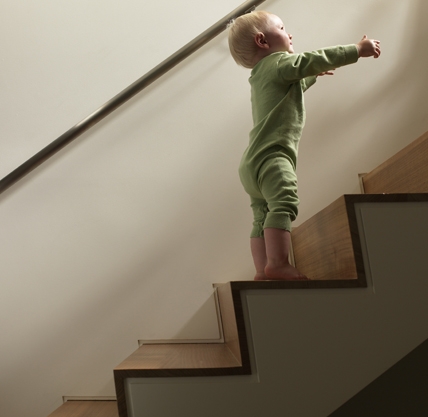
I have an 8-month-old baby who is starting to try to stand. Sometimes she falls and bangs her head on the floor. And two or three times, she has fallen from a chair or sofa (not her high chair) and banged her head on the floor. Could she have problems in the future stemming from these falls and knocks to the head?
Learning to walk is a skill we all must master unless there is a physical reason that prevents us from doing so. Babies start the process by pulling to a stand and holding onto things, then walking by holding onto the furniture, and then finally, by taking independent steps. Babies need to explore and experiment because that is how they learn. That said, we need to closely supervise the baby’s explorations to prevent falls and collisions with corners or other sharp surfaces.
If a fall from a height does occur, there are some symptoms to watch for — the most obvious being loss of consciousness. Other hallmarks of a concussion or more serious brain injury can include:
- Crying inconsolably (most babies will cry initially but will stop after a few minutes when you comfort them)
- Vomiting
- Excessive sleepiness
- Refusing to eat
- Prolonged irritability or unusual and prolonged periods of quietness and inactivity
- Bulging of the anterior fontanelle — or the soft spot of the head — is also an ominous sign.
Any of these or a combination of these symptoms means that the child should be checked immediately by a physician. Falls that are followed by these symptoms could result in long-term effects on brain development.
But remember, most children with a concussion or other mild brain injury recover from the injury completely without long-term issues. Those with a more severe brain injury and about 15 percent of those with a mild brain injury may seemingly do quite well but later in school may have organization problems, learning difficulties, attention problems, emotional regulation issues, anxiety, or depression.
Being aware of these signs and symptoms as well as the potential latent effects of a brain injury, is crucial for taking the proper medical action for your child.
About the author: Jane Gillett, MD
Dr. Jane Gillett was a neurologist certified by the Royal College of Physicians and Surgeons of Canada in both pediatric and adult neurology. She created and developed the Pediatric Acquired Brain Injury Community Outreach Program, Children’s Hospital of Western Ontario. She died in 2011.

